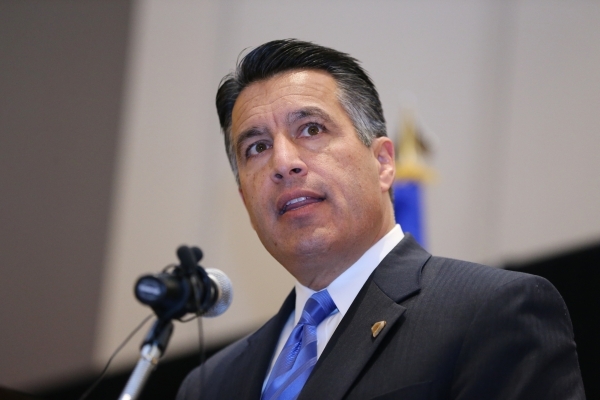Summit on Education to focus on implementing new policies
A little more than six months after Gov. Brian Sandoval signed a dizzying list of education reforms into law, policymakers and education leaders will meet Monday to consider what's next for the Silver State.
Panelists and speakers from public and higher education, business and philanthropic groups and all levels of state and federal government will join UNLV's College of Education for its inaugural Summit on Education.
The brainchild of Dean Kim Metcalf, the daylong event aims to focus on the education initiatives passed in the 2015 Legislature, which boosted spending in the state's public school system by more than $400 million.
"Our role as the state's largest college of education not only allows but requires us to work routinely with those in the academic, professional and policy communities," Metcalf said last week. "As my former colleagues in Georgia would have said, 'We have no dog in this fight.'
"We are interested only in helping to improve education policy and practice."
Aside from Sandoval's opening remarks at the summit, an official with the U.S. Education Department tops the agenda. The event closes with a look at how Nevada can invest in its future, but likely will feature updates on the $2.8 billion that lawmakers approved for public education in this year's legislative session.
This is a short list of how state and local leaders have implemented some of the more notable education initiatives passed in that session:
* Assembly Bill 165: The Nevada Education Choice Scholarship Program, also known as Opportunity Scholarships, offers tax credits for businesses who donate money for students of low-income families to attend a private school of their choice.
As of last month, three active scholarship grant organizations issued 371 grants ranging from $1,000 to $7,755 for students to attend a total of 42 schools.
Tax credits available for the 2015-16 school year were capped at $5 million, but that amount will increase by 10 percent annually.
* Assembly Bill 394: Lawmakers passed this legislation, also known as the breakup bill, in the final moments of the session. It calls for the reorganization of the Clark County School District, which many politicians consider too large to ensure the success of the 320,000 students in Southern Nevada.
Two committees charged with studying the reorganization started meeting in October, with tensions flaring at the most recent meeting before Thanksgiving.
A final plan, if lawmakers agree on one, must be submitted before Jan. 1, 2017, with the reorganization in place by the 2018-19 school year.
* Senate Bills 119 and 207: These bills allowed districts to "roll over" existing debt to pay for new school construction and facility maintenance.
With about $500 million already on the bond market, school district officials hope to break ground next spring on the first set of 12 schools.
In September, the school board approved a 10-year plan to fund, at a price tag of about $2 billion, the construction of 27 elementary schools, one high school and expansions at 54 existing campuses. An additional $2.1 billion will go toward renovations or replacements of some of the district's oldest buildings.
* Senate Bill 302: Arguably the most controversial education bill to come out of the recent session, this legislation created the nation's most expansive school choice program.
The state's new education savings accounts, which go into effect Jan. 1, offer parents about $5,000 to spend on private school tuition, tutoring and other education services — if they pull their students out of public schools.
Opponents filed two lawsuits challenging the constitutionality of the program, and on Thursday, a District Court judge in Clark County will consider the state's request to dismiss one of the lawsuits that argues public money cannot pay for religious purposes, including schools.
* Senate Bill 503: Districts already provide free and reduced-price lunch to students from low-income households, but the new Breakfast After the Bell program requires all schools in which 70 percent or more of students qualify for the discounted meals to offer breakfast after the start of the school day.
Last month, the Nevada Agriculture Department reported 110 schools that participated in the program have served an additional 781,707 breakfasts to students. That's a 20 percent increase in participation from last year.
An additional 50 schools in eight districts have spent about $337,000 on grants to help implement the program, with some campuses purchasing refrigerators, ovens, utensils and food carts.
* Senate Bill 511: As Clark County school officials struggled to fill nearly 3,000 classroom vacancies before the start of the 2015-16 school year, lawmakers approved a $15 million initiative designed to ease the teacher shortage.
The State Board of Education in July funneled nearly $10 million of that money into new teacher recruitment grants, with Clark County schools receiving $8.32 million of the total. As of last month, local school officials reported the bonus helped lower the amount of vacancies in high-needs schools from 78 percent to 70 percent.
The state board separately awarded $2.3 million in scholarships for students to spend on fast-track teacher licensing programs at UNLV, the Washoe County School District and four other institutions. Those awards should allow the placement of 134 teachers in schools across Nevada next fall.
Contact Neal Morton at nmorton@reviewjournal.com or 702-383-0279. Find him on Twitter: @nealtmorton






















